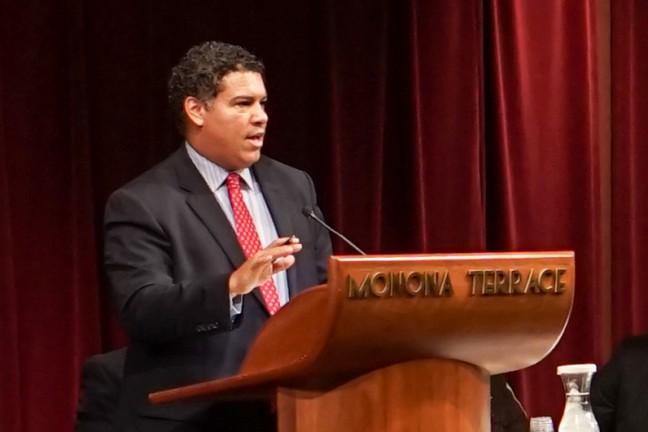The Dane County District Attorney’s Office recently implemented a new hate crime policy that looks to increase punishments for perpetrators for those crimes.
The new policy is included in the Dane County DA’s Equity and Inclusion Plan, which highlights that going forward, an additional penalty, or “enhancer,” to the perpetrator’s punishment will be included if the crime is found to be motivated by hate.
In addition to this formalized enhancer, the policy also includes the creation of an action team of staff and law enforcement. This Hate Crimes Action Team will work to handle hate crime cases through mandatory implicit bias training.
According to the Hate Crimes Initiative within the Equity and Inclusion Plan, the action team will “assemble staff from every unit of the office and several law enforcement agencies.”
In order to approve a hate crime enhancer, either District Attorney Ismael Ozanne or a deputy district attorney must approve the action. Retracting an enhancer also requires approval.
“Whether these instances be hate speech or other instances, our action team of attorneys, advocates, law enforcement — we are looking at how to better identify these cases,” Ozanne said.
According to Ozanne, increases in hate taking various forms called attention to the need for the policy. As the DA’s Office looked at hate-driven behaviors, crimes of this nature became more apparent and made clear a need to change the way they are handled in a court of law, he said.
In addition to the change in hate crime policy and creation of a team, Ozanne said the Dane County DA’s Office has begun collaborating with other community groups, such as We Are Many – United Against Hate.
“I think by bringing this policy to the forefront, it shows that we are not going to tolerate hate in our community — this is a place for everyone, not just a place for those with privilege,” Ozanne said.
We are Many – United Against Hate is a non-partisan, non-profit organization started by Muslim-American businessman Masood Akhtar. The organization’s mission is to promote equal protection for all and to fight against hate and bigotry.
The non-profit’s website notes that their goals are twofold. Their work includes outreach and intervention “to promote understanding, healing, reconciliation and redemption.” The group also advocates for policies which provide greater economic security and promote religious tolerance.
In addition to the Dane County’s DA’s Office and community activist groups, The University of Wisconsin-Madison is also working to combat crimes and bias fueled by hate to ensure the safety and well-being of all students.
UW Director of University Communications Meredith McGlone said that statistically, the number of hate crimes occurring at the university level is relatively low, stating that in spring 2019, there were none. McGlone said this is because the majority of hate related incidents are micro-aggressions.
“The university bias response process takes in a wide range of complaints and concerns, some of which involve potentially criminal behavior and many that do not,” McGlone said.
McGlone added that whether the targeted individual is looking for a response from the university or not, support meetings are commonly offered for students as a space to share the impact that the incident had on them and to provide guidance for the future.
UW Dean of Students Christina Olstad said in order to increase the education and awareness of all UW students, the program Our Wisconsin was recently revamped, and builds awareness of diverse experiences and backgrounds.
The Office of the Dean of Students also elevated the role of Bias Response Coordinator to an Assistant Director position, filled by Jenna Hee-Jung Friedman.
“We looked to elevate this position to make sure that we were appropriately supporting students and also engaging with faculty and staff across campus,” Olstad said.
In addition to new positions and programs like Our Wisconsin, UW offers many courses devoted to social justice and inclusion which examine the impact of hate and bias, according to Olstad.
Through the use of data examination, creation of inclusive programs and increased awareness and training for students and faculty, UW works to create a safe and welcoming space for all students on campus, Olstad said.
“We are constantly exploring ways to engage diversity, equity and inclusion,” Olstad said.


